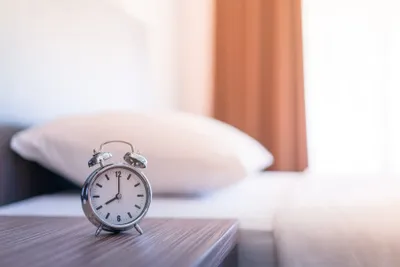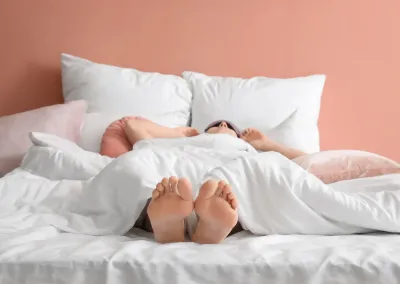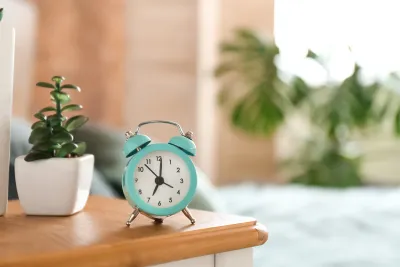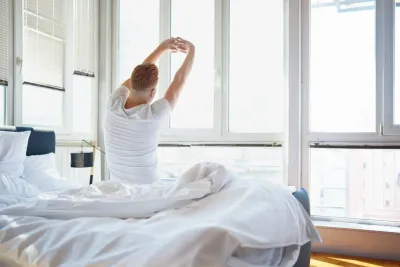The 8-Hour Sleep Myth: Discovering the Truth about Sleep
Ana Marie Schick: Resident Sleep Expert and Certified Health Coach • Sep 12, 2022

Change and sleep don’t usually go hand in hand, yet life can shake things up. For example, there are those middle-of-the-night wake-up calls from a crying baby or early mornings when your dog, leash in mouth, is itching for a walk.
Then there are those late nights your boss keeps you at work, throwing your regular bedtime out of sync.
Sure, sticking to a consistent sleep schedule and getting eight hours of shut-eye might be ideal for your health, but recent research challenges the belief that natural human beings sleep 8-hrs each night. Insights from a Harvard professor suggest that individuals, particularly those without modern technology, often require only six to seven hours of sleep, debunking the eight-hour standard.
We can’t always clock in those hours of sleep, but what really matters is making sure the sleep we get is of high quality, even if it’s not for a fixed amount of time every night.
Elevate Your Sleep Quality with Chilipad
Never wake up hot again! Elevate your sleep quality and sleep better with a Chilipad sleep system!
Quality of Sleep Over Quantity
Quality sleep improves health and performance, and not getting enough quality sleep could result in health risks such as heart disease and obesity. Therefore, getting the right amount of quality sleep is vital for mental, physical, and emotional health. [1]
So, how much quality do we need? Let’s first look at the sleep stages.
The body and brain are inherently designed to progress systematically through 4 stages of sleep. Stages 1-3 are known as non-rapid eye movement (N-REM). Stage 4 is called rapid eye movement (REM) sleep. One round of stages 1-4 lasts about 90 minutes on average. [2]
Read More: How to Find Your Sleep Duration
There’s more to good sleep than just the hours spent in bed. - Dr. Marishka Brown, Sleep expert at the National Institutes of Health

Deep Sleep
The first half of the night is your deep sleep window. During this period, everything drops further: your heart rate, your breathing, your blood pressure, your muscle activity, and your body temperature. [3]
Deep sleep is the third stage of NREM sleep, so you may hear it called NREM Stage 3 or N3. In sleep medicine, deep sleep may be referred to as slow-wave sleep (SWS) because your brain waves are the slowest at this stage. It may also be called “delta sleep” due to the fact delta waves are seen on the electroencephalogram (EEG).
These slow delta waves indicate you’ve reached a deeply meditative and dream-free sleep. [4] [5]
REM Sleep
REM sleep occurs when the eyes tend to dart back and forth in different directions under closed eyelids. This is when dreams most often take place. Although it might seem those eye movements are due to the scanning of dream images, this has not been definitively proven. [6] Other names for REM include active sleep, desynchronized sleep, and paradoxical sleep. [7]
Read more on why REM sleep is so important.
Now that you have an understanding of the sleep stages, we can discuss how much deep sleep is needed. The ideal amount is two hours. However, how much you get will depend on your age and current sleep needs.
According to research by the US Committee on Sleep Medicine and Research, healthy adults spend roughly 13-23% of their sleep in deep sleep. [8]
Quality vs. quantity of sleep is critical. Just focus less on a set number and more on allowing your body to move naturally into a deep sleep so you wake up feeling rested. If you only get five hours of sleep, make it the best five hours possible.
Recommended Sleep by Age
The Centers for Disease Control and Prevention (CDC) provides guidelines for the recommended amount of sleep for different age groups. These are just general recommendations, and individual needs may vary from person to person. [9]
However, sticking to these guidelines can help improve overall health.
Newborn
14 to 17 hrsInfant
12 to 16 hrsToddler
11 to 14 hrsPreschool Age
10 to 13 hrsSchool Age
9 to 12 hrsTeenager
8 to 10 hrsAges 18 - 60
7+ hrsAges 61 - 64
7 to 9 hrsAges 65 and older
7 to 8 hrs
Read our blog for more information on promoting healthy sleep habits for teenagers.
8-Hour Sleep Myth and Sleep Deprivation
Differentiating between facts and myths can be difficult at times. Do we need to sleep eight hours every night? Is drinking eight glasses of water each day necessary? Will we actually get warts from touching a toad?
We’ve heard these things for so long that we start to believe them. Where did the rule of sleeping eight hours each night come from?
Modern lifestyle pressures can lead to people feeling sleep deprived despite the eight-hour rule.
Psychologist Haily Meaklim blames the industrial revolution for the 8-hour sleep time.
“The saying that everybody needs eight hours of sleep is associated with the industrial revolution – eight hours labour, eight hours recreation, eight hours rest,” she said. “Genetics, age, medical conditions, environmental, and behavioral factors determine how much sleep you need.
Some people require more and some need less. Certain people function well on less than six hrs, and can actually experience insomnia when aiming for eight hours every night.”
Psychologist Stephanie Centofanti agrees:
“We often hear eight hours as being the magical number to strive for, but in fact, sleep needs vary greatly between individuals. It’s important to figure out what works best for you and to prioritize sleep so you are getting enough sleep every night.” [10]
Understanding Sleep Needs
Sleep needs can vary greatly among individuals due to factors like age, genetics, lifestyle, and overall health. The National Sleep Foundation recommends a range of seven to nine hours of sleep for adults, indicating that one size does not fit all.
Factors like chronotypes, sleep quality, and individual sleep needs should be considered when determining how much sleep a person needs. Understanding sleep needs is crucial for achieving good sleep quality and overall health.
Chronotypes and Sleep Patterns
Chronotypes refer to individual variations in biological rhythms that influence a person’s natural sleep-wake patterns. Chronotypes categorize individuals as morning people (early birds), evening people (night owls), or somewhere in between.
The strict insistence on getting a solid eight hours of sleep ignores the idea of chronotypes and can lead to sleep deprivation. Recognizing and respecting individual chronotypes is essential for getting the best sleep possible.
How Body Temperature Affects Sleep
How do we prioritize restful sleep without necessarily adhering to the 8-hour myth as a guideline? Meditation, mindfulness, journaling, and keeping our eyes away from blue light found in devices/televisions are all great starting points to improving sleep quality.
Once our mind is in a calmer state, we can better let go of the day and embrace our body’s need to sleep and recover. Then, once you’re cozy in bed, tired, and mentally prepared to rest, your body needs a physical change to happen to signal that it’s the appropriate and safe time for sleep. This change is a drop in temperature.
Matt Walker, Professor of Neuroscience and Psychology at the University of California, Berkeley, and founder of the Center for Human Sleep Science recommends eight hours of sleep, but says optimal sleep time can range between seven hours and nine hours. He does believe dropping your core temperature is vital for uninterrupted sleep.
"Your body needs to drop its core temperature by about two to three degrees Fahrenheit to initiate sleep and then to stay asleep, and it's the reason you will always find it easier to fall asleep in a room that's too cold than too hot,” Walker said. [11]" - Matt Walker, Professor of Neuroscience and Psychology at the University of California, Berkeley
But lowering our bedroom temperature can only go so far. To have an impact on our internal body temperature, we have to start with the bed we’re sleeping on. Our Cube and Chilipad Dock Pro bed cooling systems can lower your body temperature at night, providing quality, deep sleep.
Benefits of Sleeping Cooler
- The quicker the body can shed heat, the quicker it can get to sleep.
- The faster it gets to sleep, the faster the sleep cycle kicks in.
- The sooner the sleep cycle kicks in, the sooner your body can begin the natural process of repairing cellular structures, making sense of the brain’s memory of events, and preparing the body to power through the next day.
Read More: The Best Techniques to Fall Asleep Fast
Final Thoughts
It's not just about the number of hours you spend in bed; it's about how restful those hours truly are. Life throws curveballs – late-night feedings, early morning pet duties, and unpredictable schedules. But even if you don't always get eight full hours, you can still prioritize quality rest
Peer-Reviewed Research References
-
U.S. Department of Health and Human Services.
Good Sleep for Good Health.
National Institutes of Health, 2022.
Source Type: Government Health Education Resource
Key Insight: Adequate sleep is essential for brain function, immune health, emotional regulation, metabolic balance, and long-term disease prevention.
-
Cleveland Clinic.
Sleep: How Much You Need and Its Four Stages.
Cleveland Clinic, 2021.
Source Type: Clinical Health Education Resource
Key Insight: Sleep progresses through non-REM and REM stages, each playing a distinct role in physical restoration, memory consolidation, and emotional processing.
View Resource
Source URL: https://health.clevelandclinic.org/your-complete-guide-to-sleep/
-
National Institute of Neurological Disorders and Stroke (NINDS).
Brain Basics: Understanding Sleep.
NIH, 2022.
Source Type: Government Neuroscience Resource
Key Insight: Sleep supports neural repair, learning, memory formation, and communication between brain regions critical for daytime functioning.
-
Patel, A. K., & Araujo, J. F.
Physiology, Sleep Stages.
StatPearls Publishing, 2018.
Source Type: Medical Physiology Reference
Key Insight: Each sleep stage is associated with distinct physiological processes, including muscle relaxation, autonomic regulation, and neural synchronization.
View Resource
Source URL: https://www.ncbi.nlm.nih.gov/books/NBK526132/
-
Colten, H. R., & Altevogt, B. M. (Eds.).
Sleep Disorders and Sleep Deprivation: An Unmet Public Health Problem.
National Academies Press, 2006.
Study Type: Government-Sponsored Scientific Consensus Report
Key Finding: Chronic sleep deprivation is a major public health concern linked to increased risk of accidents, chronic disease, reduced productivity, and impaired cognitive performance.
View Resource
Source URL: https://pubmed.ncbi.nlm.nih.gov/20669438/
-
Felson, S.
What Are REM and Non-REM Sleep?
WebMD, 2005.
Source Type: Consumer Medical Education Resource
Key Insight: REM sleep is associated with dreaming and emotional processing, while non-REM sleep supports physical restoration and immune function.
View Resource
Source URL: https://www.webmd.com/sleep-disorders/sleep-101
-
Summer, J.
REM Sleep: What It Is and Why It Matters.
Sleep Foundation, 2021.
Source Type: Sleep Science Education Resource
Key Insight: REM sleep plays a crucial role in emotional regulation, learning, creativity, and memory integration.
-
Centers for Disease Control and Prevention (CDC).
How Much Sleep Do I Need?
CDC, 2022.
Source Type: Government Public Health Guidance
Key Insight: Recommended sleep duration varies by age, with most adults requiring 7–9 hours per night for optimal health.
-
Hansen, A.
The Rule That Everyone Needs Eight Hours of Sleep Is a Myth.
Quartz.
Source Type: Science Journalism & Expert Commentary
Key Insight: Individual sleep needs vary, influenced by genetics, lifestyle, and health status, though consistency and sleep quality remain critical.
-
Walker, M.
Reclaim Your Right to a Full Night’s Sleep.
2023.
Source Type: Sleep Science Commentary
Key Insight: Modern lifestyles often undermine sleep quantity and quality, despite sleep being foundational to physical and mental health.









